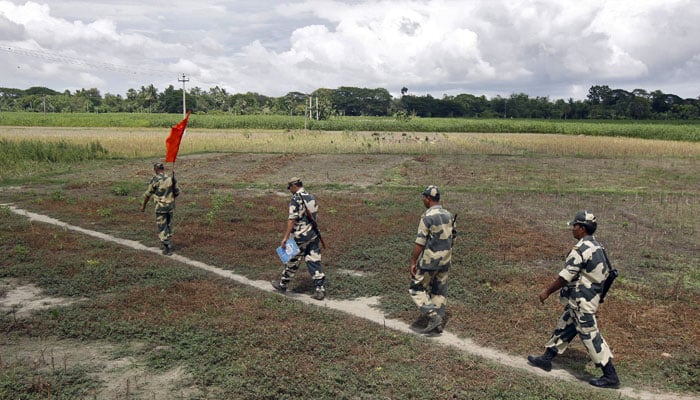DM Monitoring
KOLKATA: Security forces from India and Bangladesh had a tense confrontation this week over the construction of a fence supposedly meant to keep cattle from straying over their shared border, officials said.
Relations between both countries are fragile after the August 5 overthrow of autocratic Bangladeshi ex-premier Sheikh Hasina, who is now in exile in India after a student-led uprising toppled her.
New Delhi was Hasina’s biggest patron and benefactor and many Bangladeshis have since been openly critical of their bigger and more powerful neighbour for backing her 15-year rule.
The latest dispute arose on Thursday, when India’s Border Security Force (BSF) claimed they were stopped from erecting the fence by their Bangladeshi counterparts. “Tension flared up after Bangladesh border guards sought to block the building of a cattle fence,” BSF deputy inspector general A. K. Arya said.
“But there was no violence.” Bangladesh is almost entirely encircled by India and the border stretches for more than 4,000 kilometres (2,485 miles), large parts of which are unfenced.
Indian officials claim the fence was being built as part of a 2012 agreement to stop cows from either side wandering over the frontier or from being stolen, according to local media reports.
Cattle smuggling has been a source of tension between the two countries but this news agency could not independently verify the purpose behind the construction of the fence. India has also built fences designed to deter humans from crossing elsewhere along its shared frontier with Bangladesh.
Five Indian boat operators hired by the BSF to prevent cattle smuggling were arrested by Bangladesh border guards this month after their boats drifted across the river border. The five were handed over to Bangladesh police authorities, according to the BSF.
Arya said the boats often inadvertently cross into Bangladeshi territory due to strong currents in the river Ganges. He said BSF officials had requested the return of the Indian boat operators but Bangladesh border guards refused, citing the current diplomatic situation and media pressure in Bangladesh. India has also arrested numerous Bangladeshis attempting to cross the border to escape the political tumult sparked by Hasina’s departure.
Prime Minister Narendra Modi’s government has also sounded alarm over reports of attacks on Bangladesh’s Hindu minority immediately following Hasina’s overthrow.
Hindus in Muslim-majority Bangladesh are seen as disproportionate supporters of Hasina’s Awami League party.
But Indian social media users and broadcasters have also alleged attacks on Hindus well out of proportion with verified incidents — another source of diplomatic tension between the neighbours.




